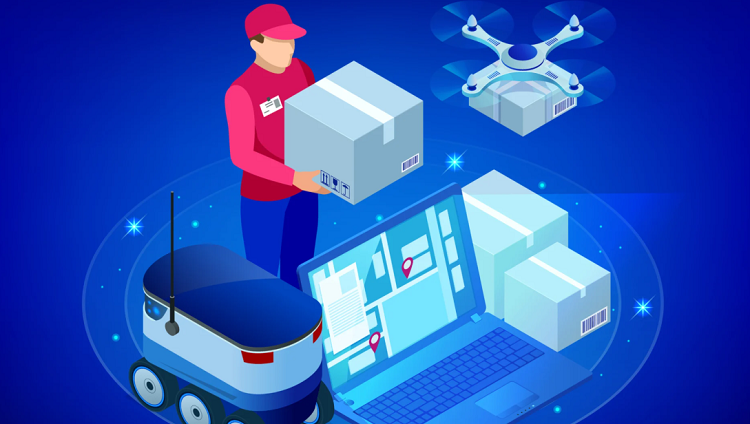Supply chain management has evolved in such a manner that without the adoption of new technologies, it’s impossible to survive. AI in logistics turned out to be a game changer that brought solutions for speedier operations, better decision-making, and higher efficiency for each component in a supply chain. This article will explain how AI can revolutionize supply chains for improved profitability, from inventory management to transportation optimization.
Table of Contents
How Can AI Predictive Analytics Help Businesses Forecast Demand?
Balancing stock availability with cost control is one of the critical challenges of supply chain management. Predictive analytics powered by AI uses historical data, market trends, and external factors to predict demand accurately. Thus, businesses cut down on the risk of stockouts, overstocking, and obsolescence.
Implementing AI in logistics and supply chain allows scanning sales for seasonal surges in demand and calculates appropriate warehouse stock. Therefore, your business can avert excessive inventory costs. With such insights, businesses can align their procurement and production more in tune with demand and thus create a resilient supply chain.
What Are the Specific Ways AI Can Optimize Inventory Management?
AI platforms are great for automating and perfecting inventory management. Using AI for logistics, one can track real-time inventory levels and optimize reorder points. You will also be able to forecast any stock-out dates for a particular product.
In more advanced stages, machine learning algorithms analyze sales patterns and lead times to evaluate supplier reliability and ensure just-in-time inventory management properly. AI further fuels warehouse slotting optimization to identify the most opportune places for products according to demand and movement profile, attempting to decrease retrieval times and manpower costs accordingly.
How does AI Automation Better the Efficiency of Warehouse Operations?
Warehouses are the heart of any supply chain, and efficiency here directly affects the company’s bottom line. The adoption of AI in logistics and transportation will drive you to automate processes related to sorting, picking, and packing in warehouses.
Besides, AI-powered robotics could work alongside human employees to boost productivity by reducing human errors. IoT devices will be able to make it possible for AI-driven systems to analyze real-time data for monitoring the state of warehouses, predict equipment maintenance needs, and optimize energy consumption. This way, you could create so much more cost-efficient and sustainable operations.
What Role Can AI Play in Optimizing Transportation and Logistics?
Another way AI in transportation can make a big difference to your business is through route optimization tools. These solutions make use of real-time traffic data, weather conditions, and deadlines for delivery to find the best routes for delivery. This would result in reduced fuel consumption and facilitate the delivery of packages on time.
Generative AI in logistics will further enhance transportation planning by simulating scenarios, which can point out potential bottlenecks and strategize around them. Finally, AI will automatically optimize loads to ensure that correct shipment packaging is performed with vehicle capacity in mind.
How Can AI-Powered Chatbots and Virtual Assistants Enhance Customer Service?
Customer service is an important part of supply chain management, especially in B2C operations. AI-driven chatbots and virtual assistants can handle routine queries that come for delivery status, order tracking, or product availability, freeing your human employees to deal with more complex issues.
Such tools, powered by artificial intelligence in logistics and the supply chain, offer instant, correct answers to enhance customer satisfaction and loyalty. Further, AI-driven customer service tools can analyze sentiments and feedback. Valuable insights drawn from such an analysis could improve the services and address recurring issues.
What Are the Potential Benefits of Using AI to Improve Supply Chain Visibility?
Visibility is critical for a seamless supply chain process. AI-enabled tools gather information from multiple sources and show one standardized view of the whole supply chain. This helps identify inefficiencies, ensure real-time tracking of shipments, and assess supplier performance. AI in logistics and supply chain enables scenario planning by modeling various disruptions and ripple effects across the network. Increased visibility implies better decision-making, robust partnerships, and an ever-responsive supply chain.
How Can AI Be Used to Identify and Mitigate Risks in the Supply Chain?
Some of the key uses of AI in logistics pertain to risk management. By analyzing both historical and current data, AI tools can assist in predicting and mitigating risks. For instance, predictive analytics could observe a potential disruption of supplies, transport, or geopolitical movement that may affect the operations.
AI systems also ensure that businesses remain compliant with regulatory requirements to avoid pricey fines and damage to brand image. Proactively addressing these risks ensures that the company’s operations are running and that minimal loss occurs.
How Can Businesses Measure the ROI of AI Investments in Supply Chain Optimization?
Measuring the return on investment of AI implementations involves gauging tangible metrics as well as benefits that cannot be attributed to materialistic values. Tangible metrics include cost savings because of reduced labor, improved delivery times, and fuel consumption.
On the other hand, the intangible benefits of using AI for logistics are huge, including increased customer satisfaction and improved decision-making. For example, businesses can leverage KPIs in order accuracy, cycle times, and inventory turnover rates to quantify the impact of AI in transportation and logistics.
Conclusions
AI in logistics and transportation is highly impacting how supply chains work. Predictive analytics, automation, and real-time insights are but a few of the ways in which businesses can enhance efficiency, improve customer experiences, and reduce risks.
From optimizing inventory to building warehouse efficiencies and more visibility, the positives that artificial intelligence affords for logistics and the supply chain are great. The value of such tools that companies will benefit from is a much-needed competitive edge with continued improvement in AI technologies and surely will ensure long-term success in an increasingly complicated global market.

